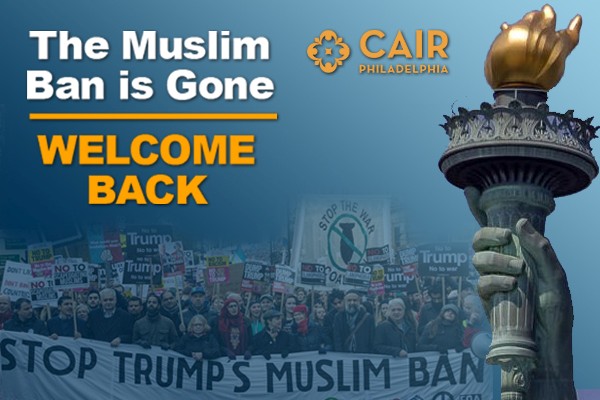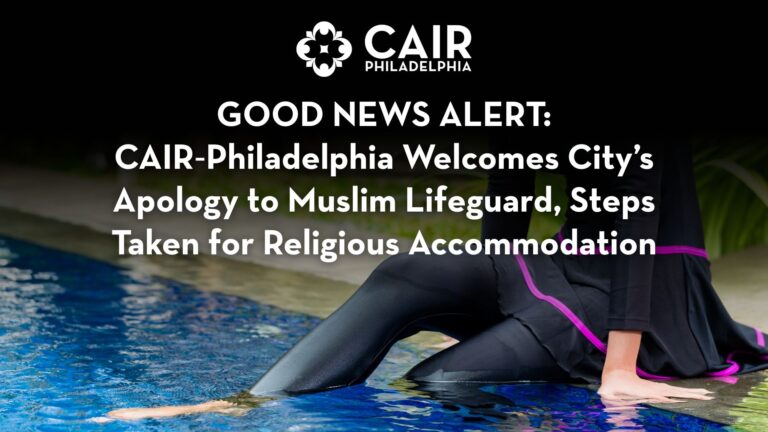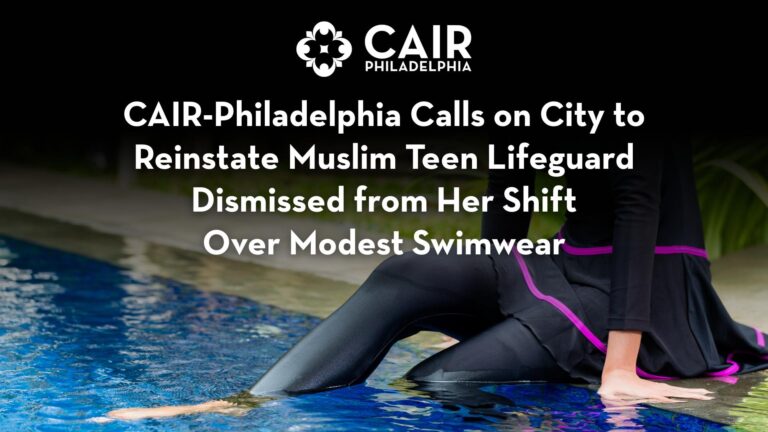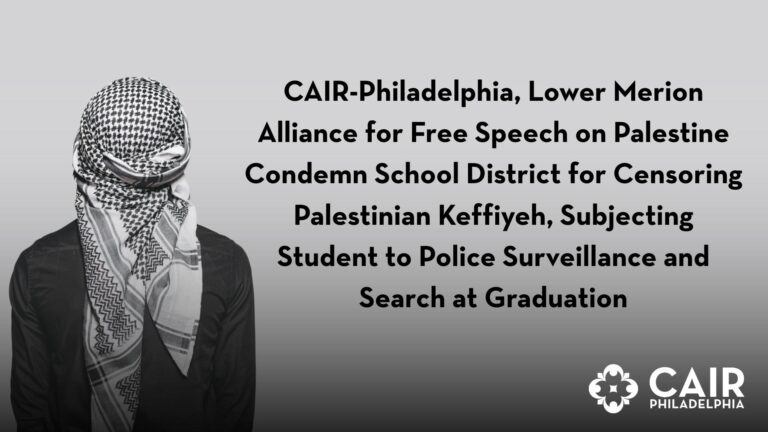(PHILADELPHIA, PA, 01/21/21) – The Council on American-Islamic Relations (CAIR), the nation’s largest Muslim civil rights and advocacy organization, today welcomed President Joe Biden’s announced termination — on his first day in office — of the previous administration’s discriminatory Muslim and African Bans.
SEE: Proclamation on Ending Discriminatory Bans on Entry to The United States
VIDEO: Inauguration Day Muslim Community Priorities Town Hall by CAIR
In a statement CAIR-Philadelphia Executive Director Jacob Bender said:
“We commend President Biden for immediately moving to repeal the Muslim and African Bans, which is an important first step toward undoing the anti-Muslim and anti-immigrant policies of the previous administration. It is an important fulfilment of a campaign pledge to the Muslim community and its allies.
“We expect the Biden administration to go further by supporting passage of the No Ban Act and addressing systemic injustices within the federal government that led to religious and racial profiling of Muslims and immigrants under multiple administrations.
“CAIR also welcomes the Biden Administration’s move to preserve and fortify protections for Dreamers; inclusion of all persons — including the undocumented — in the U.S. census count; ordering the removal of barriers preventing minorities and underserved communities’ access to federal programs and institutions; and other impactful executive orders.
“Finally, the American Muslim community urges President Biden to fulfill his campaign pledge to appoint Muslims at every level of government.”
CAIR is America’s largest Muslim civil liberties and advocacy organization. Its mission is to enhance understanding of Islam, protect civil rights, promote justice, and empower American Muslims.
La misión de CAIR es proteger las libertades civiles, mejorar la comprensión del Islam, promover la justicia, y empoderar a los musulmanes en los Estados Unidos.
– END –
CONTACT: CAIR-Philadelphia Executive Director Jacob Bender, 917-660-3805 (mobile), jbender@cair.com
Muslim and African Ban Rescission: What It Means For Impacted Communities
Our thanks to colleagues at CAIRSFBA and AJALC for this advisory.
Yesterday, President Biden signed a Proclamation ending the Muslim and African Bans. This Proclamation repeals Executive Order 13780 and Proclamations 9645, 9723, and 9983, which were rooted in Islamophobia and anti-Blackness, and restricted entry into the United States for people from primarily Muslim and African countries.
In this advisory, a project of our coalition with the No Muslim Ban Ever campaign, drafted by the attorneys at CAIR-SFBA and Advancing Justice-Asian Law Caucus, we explain what the Proclamation does and the work that remains to be done to undo the damage wrought by the Bans.
Timing
The Proclamation is effective January 20, 2021.
What the Proclamation Means
The United States government will no longer deny immigrant and nonimmigrant visas to nationals of Libya, Iran, Somalia, Yemen, Syria, Sudan, Nigeria, Tanzania, Myanmar, Eritrea*, Kyrgyzstan, North Korea, and Venezuela, solely because of their country of nationality. [* B1/B2 visitor visas from Eritrea were previously suspended under different guidance which remains in place.]
What to Expect
The rescission of the Muslim and African Bans will likely not result in an immediate solution for those whose applications have been denied or are pending consideration of a waiver under the Ban.
However, the President has directed the Department of State to submit a report with the following information within 45 days (March 6, 2021):
- The number of people whose applications are being considered for waivers under the Bans and a plan for expediting these applications;
- A proposal to ensure that people who were previously denied visas under the Bans may have their applications reconsidered; and
- A plan to ensure that people whose visa applications were denied under the Bans are not denied visas in the future solely because of these previous denials.
The President has also directed the Departments of State and Homeland Security to report on the effectiveness of the “extreme vetting” procedures put in place by the prior administration within 120 days (May 20, 2021). Under extreme vetting procedures, the United States government requires people applying for visas to submit information about their social media accounts, their siblings, and their work, employment, and travel history for the past fifteen years. It is unclear whether the President will reconsider the current practice of extreme vetting after May 20, 2021.
What You Can Do
If you have had an interview at a consulate abroad and were “refused” a visa under INA 212(f) you may contact the consulate and request that they reevaluate that decision in light of the Muslim Ban recission.
If the consulate is not able to assist you, you can contact your elected representative and request that they intervene on your behalf. You can find your representative here.
If you have not yet had an interview at the consulate, the Muslim and African Bans will not be applied when you are scheduled for an interview.
COVID-19 Restrictions Affecting Immigration From Impacted Countries
President Biden has not yet rescinded the other bans restricting immigrant and nonimmigrant visas in place due to the COVID-19 pandemic.
Presidential Proclamations 10014 and 10052, which suspended the entry of certain employment-based immigrants and nonimmigrants into the United States in light of the COVID-19 pandemic are still in effect until March 31, 2021. You can find more information here.
Additionally, proclamations 9984 and 9992 are still in effect, which suspend entry into the United States of immigrants who have been physically present in China or Iran, in the 14 day period prior to their entry or attempted entry into the United States, unless able to meet the criteria for an exception.
Finally, in light of the COVID-19 pandemic, visa services are limited. Please contact the nearest consulate or embassy for more information. Applicants with an urgent matter who need to travel immediately may request an emergency appointment.
How to Get Help
Both of our organizations provide information and legal services free of charge. You can contact our organizations if:
- You or someone you know is impacted by this Muslim Ban and would like to be connected to our partners for free legal advice or assistance;
- Your community or organization would like to request a “Know Your Rights” webinar.
Contact us at pa.cair.com/contact or email info@philadelphia.cair.com
How You Can Help
Support the No Ban Act, which if enacted would change immigration law to prohibit discrimination based on religion and limit executive authority to prevent any president from issuing future bans like the Muslim and African Bans. Visit repealtheban.org to sign our petition and call.repealtheban.org to contact your representatives in Congress to ask them to support the No Ban Act.
What is Next? CAIR’s Demands from Biden Administration
First authorized on January 27, 2017, the travel ban was amended several times to place varying levels of discriminatory travel restrictions on mostly Muslim and African citizens and government officials from Burma, Eritrea, Kyrgyzstan, Libya, Nigeria, North Korea, Somalia, Sudan, Syria, and Tanzania, Venezuela, and Yemen.
Because of the ban, families have been ripped apart, students have been deprived of educational opportunities, the sick have been blocked from receiving treatment, talented workers have lost out on jobs, and refugees have been trapped in dangerous conditions. CAIR believes that the Biden administration now is responsible for determining how to holistically address the damage already done by the Muslim ban and how to help those who were denied entry into the United States.
In December, CAIR publicly released its report, “Biden-Harris Administration – The First 100 Days – Restoring the Rights of American Muslims and Advancing Justice for all Americans.” Endorsed by the U.S. Council of Muslim Organization, these recommendations address the concerns of the American Muslim community in confronting racial and religious discrimination, ending unconstitutional federal law enforcement programs, and elevating issues important to our community and our neighbors.
Having terminated the Muslim Ban, CAIR is now calling on the Biden administration to push forward to authorize and begin the process of carrying out the civil rights reforms mentioned in the report.





